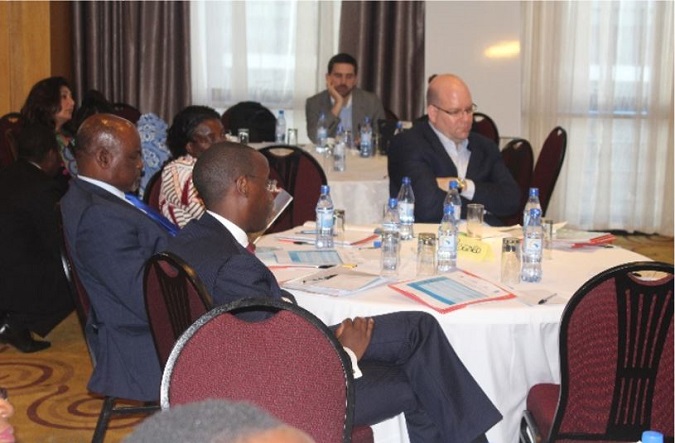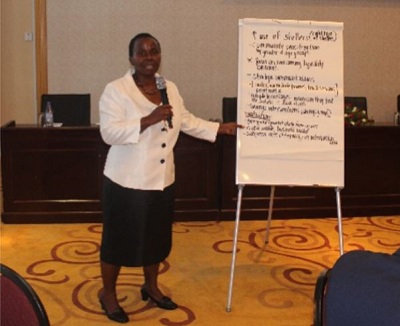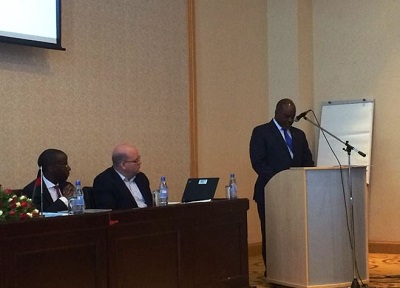The Cost of the Gender Gap in Agricultural Productivity Report officially launched in Malawi
Date:

The much anticipated report, The Cost of the Gender Gap in Agricultural Productivity, which evaluates data from Malawi, Tanzania and Uganda, was launched on the 24th of March, 2016 at the Bingu International Conference Centre in Lilongwe, Malawi. The function was hosted by World Bank, UN Women, and the UN Development Program- UN Environment Program-Poverty Environment Initiative and brought together key officials from government ministries and key stakeholders from the NGO’s and civil society organizations.
In Malawi as in most African countries, women are essential to agricultural productivity; they make up 70 percent of the agricultural labor force, produce 70 percent of household food and perform between 50 and 70 percent of all agricultural tasks. Despite their integral role in the agricultural sector, women continue to produce significantly less than men because of their limited access to land, labor, knowledge, fertilizer and improved seeds. The study found that if the gender gap in agricultural productivity is closed in Malawi, the country can increase its crop yield by 7.3 percent per annum and increase its GDP by 1.8 percent. This translates into a financial gain of approximately 100 million US Dollars, an amount which can lift over 238,000 people out of poverty each year. Closing the gender productivity gap in agriculture will result in poverty reduction, better nutrition and ultimately, benefit all Malawians by boosting the national economy and is therefore smart economics.

Stakeholders attending the launch lobbied the Government of Malawi to invest in closing the gender gap in agricultural productivity in order to increase gains and benefits from the agricultural sector.
A road map was designed which outlined the next steps moving forward which includedcarrying out a cost-benefit analysis to highlight potential benefits of closing the gender gap, distinguishing between choices and constraints, addressing and changing detrimental cultural norms through good policies, and innovations and piloting, evaluating and sharing best practices. The World Bank’s Gender Innovation Lab, which generated the data used in the report, focuses on providing impact evaluations on interventions that address gender equality and using their findings in designing sound, scalable and innovative programs.
The UN Women representative indicated that UN Women is dedicated to gender equality, and strive to empower and uplift women. Focusing on empowering women farmers has the potential to drastically improve the lives of all Malawians, and lift close to a quarter of a million Malawians out of poverty. The representative further indicated that making current agricultural policies more gender responsive is key to reaching our goals. Our agriculture policies, extension services, and training programs can be revised to actively promote the success of women farmers.

The former Minister of Agriculture, Irrigation and Water Development who was in attendance emphasised that the efforts required to close the gender gap should transcend technical solutions and also encompass changes in culture, practices, norms and values, calling for an integrated and holistic approach, involving a broad array of stakeholders at different levels of engagement.
The Ministry of Agriculture, Irrigation and Water Development is currently implementing activities within the framework of the Agriculture Sector Wide Approach (ASWAp). The ASWAp reflects the priorities encapsulated in the Malawi Growth and Development Strategy II and the Comprehensive African Agricultural Development Programme (CAADP) of the African Union. The report was recognised as an effective tool, to support the influencing of existing and planned policies and strategies, targeting productivity enhancements in Malawiincluding the implementation of the ASWAp at the national level and the Sustainable Development Goals at the international level. The findings of the report suggest that closing the gender gap in agricultural activity in Malawi will in particular go a substantial way in addressing the first SDG, eradicating extreme poverty for all people, everywhere.